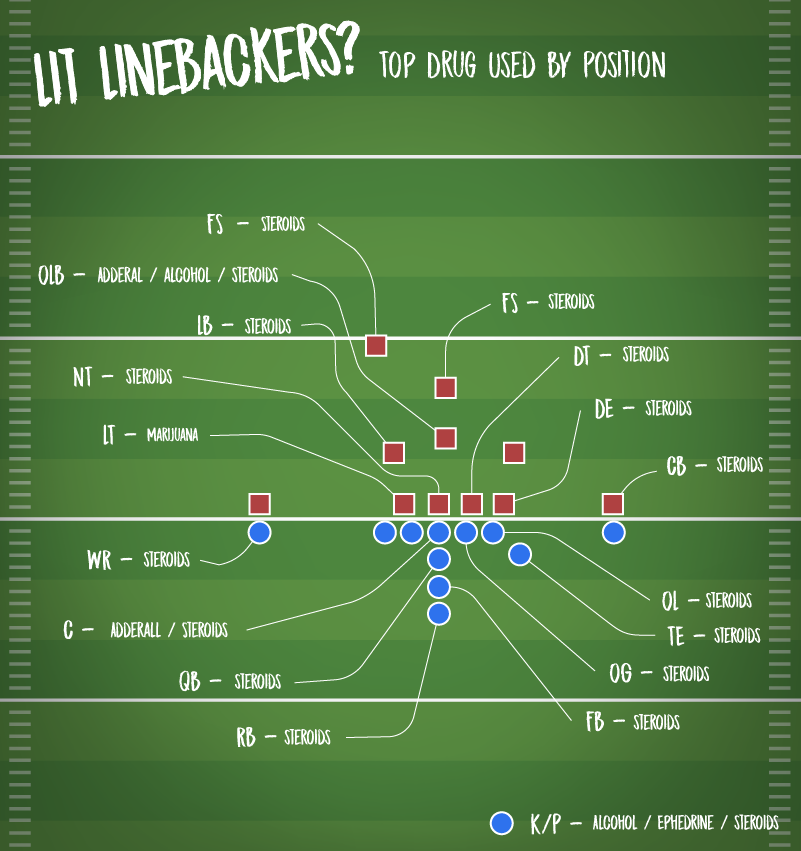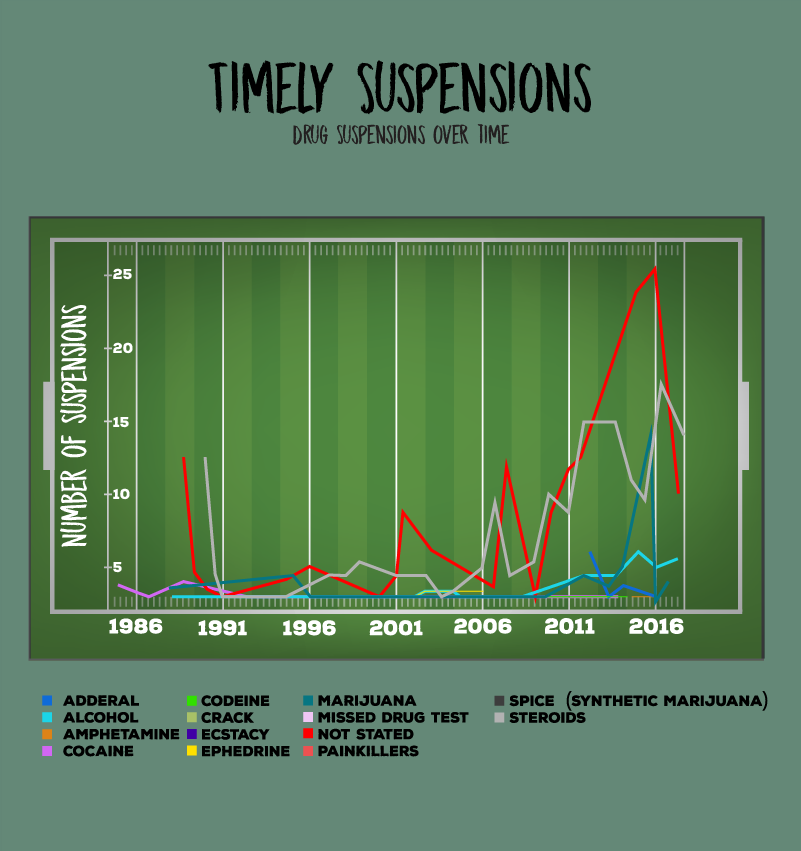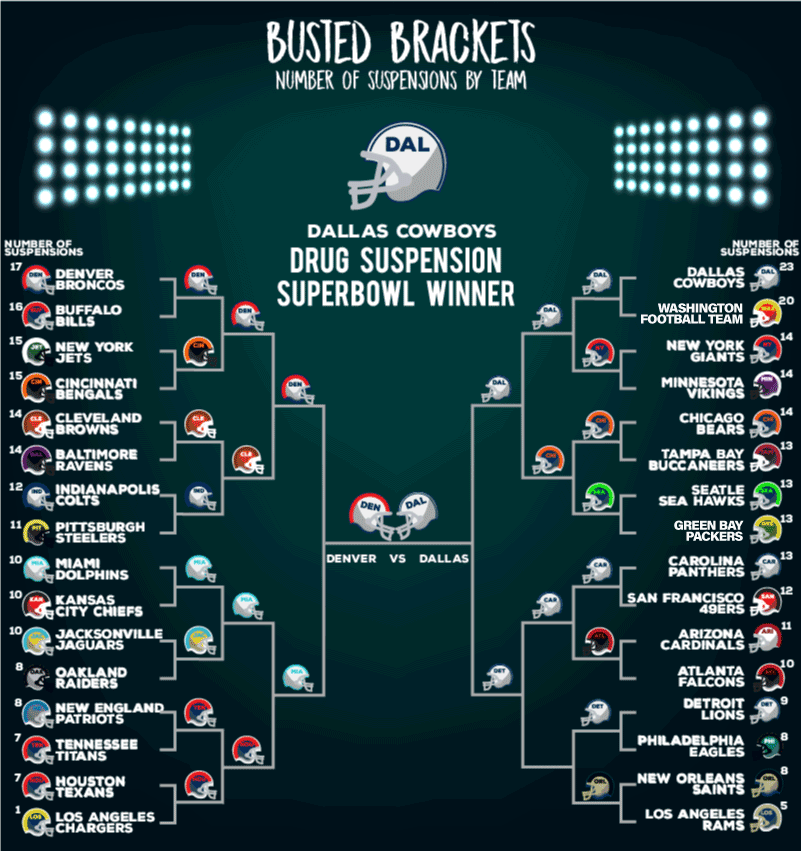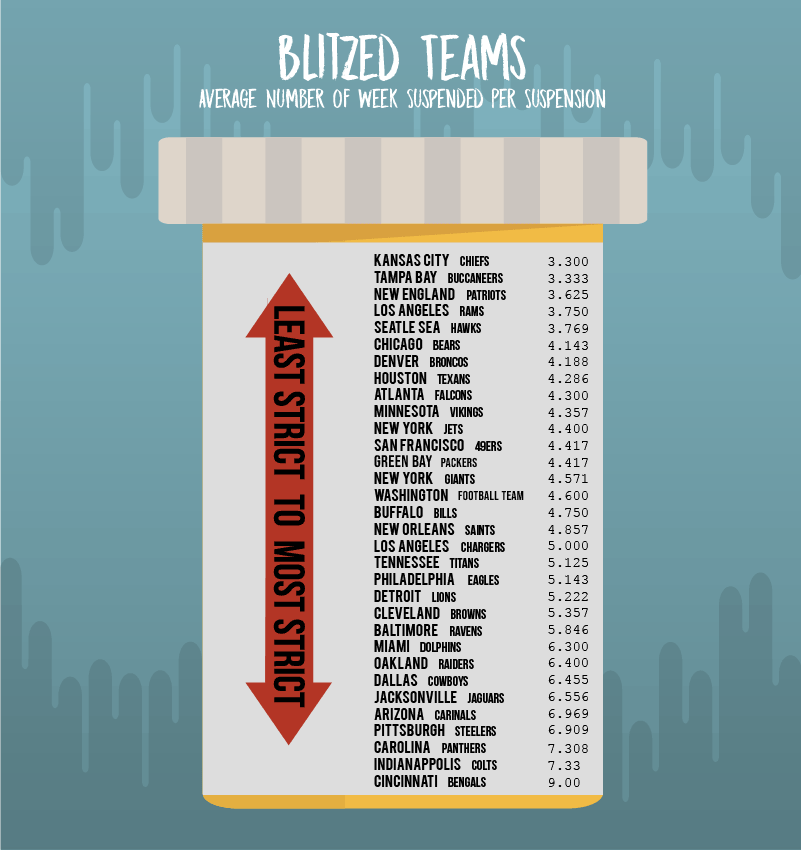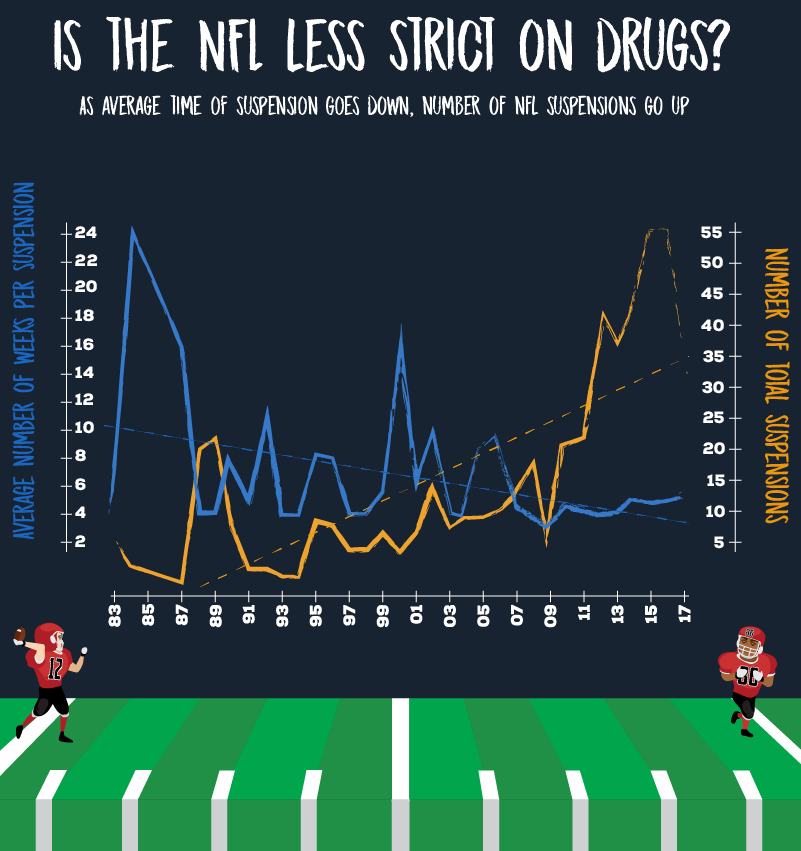
In the United States, there’s no bigger name in professional sports than the National Football League, known to most as the NFL. With a cool $13 billion in revenue over the course of the 2015-2016 season, the difference between the NFL and the next highest-grossing sports league in America (Major League Baseball ) could be covered by just one team alone. In 2019, the Dallas Cowboys were worth $5.5 billion on their own.
With all of that money, it isn’t sponsorships, records, or championship games that make the headlines year after year. No matter how hard they try, the NFL just can’t seem to shake its issues with NFL drug policy and addiction.
From the effect drugs have had on some of the league’s most promising young talent (like Josh Gordon or Johnny Manziel) to the legacy left behind by some of the most iconic athletes to ever play the game (like Lawrence Taylor), the impact drugs and NFL drug use have had on the NFL is undeniable. To chronicle this history as well as the effects and fallout, we researched every drug conviction in the NFL since 1983 – the start of the NFL drug policy. Read on to see what we discovered about which teams and positions have the most sordid record of drug use in the National Football League.
The NFL’s Dirty Little Secret
Of the 23 unique player positions that make up every NFL team’s 53 person roster, steroids have been the most commonly misused narcotic over the last 34 years. With 21 positions (including four that tied) reporting steroids as the most frequently used drug in the league, the NFL’s history of performance-enhancing drugs (PEDs) has been far-reaching.
Since the ‘80s and ‘90s, the face of steroids in the NFL has evolved. In 2013, one unnamed player in the NFL described the use of HGH (human growth hormone – typically used to build muscle and improve performance) as being “like clockwork.” In 2015, when an Al Jazeera report claimed Peyton Manning, the Super Bowl-winning quarterback of the Denver Broncos, was guilty of using HGH, the sports community took note. Not until 2014 had NFL players even been tested for HGH, and not until 2017 did the league finally admit that players had tested positively (and been suspended) for the substance. Some critics have argued that the league isn’t doing enough to prevent or punish the use of steroids and that as many as 10 to 40 percent of current players could be using HGH. Among some of the most noticeable steroid scandals in sports history, NFL players are surprisingly absent from most lists. In September 2017, they failed to release any of the player’s names.
While noticeably less common than the use of steroids, Adderall, alcohol, marijuana, and cocaine were also commonly misused substances by NFL players in certain roles. In 1986, Cleveland Browns safety and college star Don Rogers died of a cocaine overdose at the age of 23. More recently a coach for the Miami Dolphins is under investigation after a video was released reportedly showing him ingesting a cocaine-like substance.
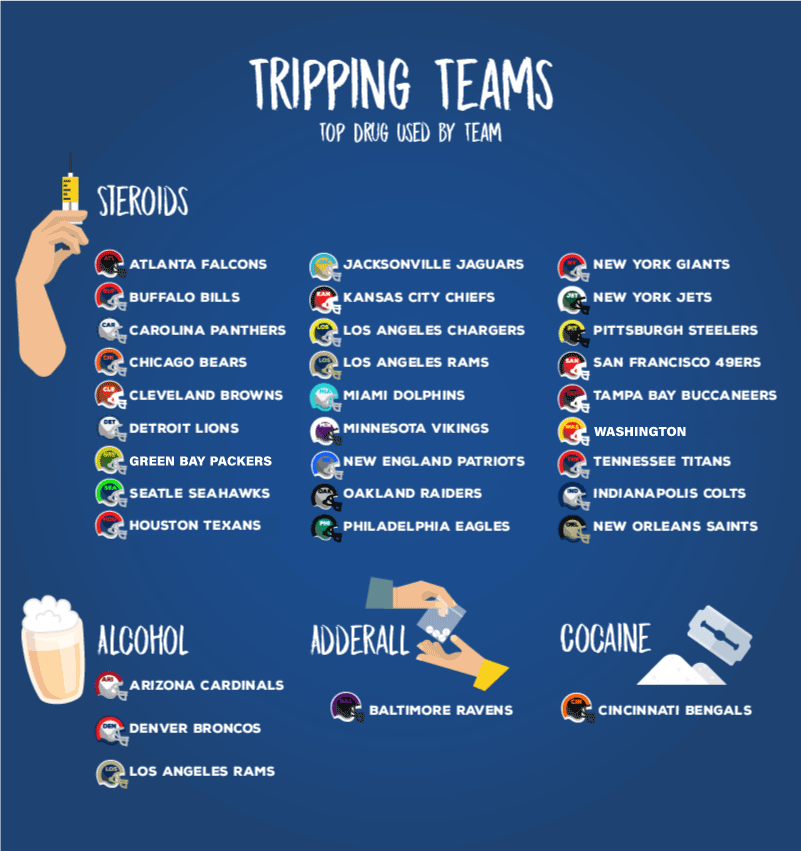
The Other Side Of History
In the same way that players from most NFL positions more commonly misused steroids than any other type of drug, most teams have had similar experiences since 1983. Of the 32 teams across the league today, 28 had more history and suspensions related to steroid use than alcohol, adderall, or cocaine.
Beginning perhaps as far back as the ‘60s, long before professional football players and their coaches ever thought they’d need policies for drugs, the ’63 San Diego Chargers might have been the first team to embrace the use of steroids. For years after them, accusations would swirl around other successful teams and players including the Pittsburgh Steelers, Kansas City Chiefs, Dallas Cowboys, and Oakland Raiders.
In reality, the steroid use that has plagued the league since its earliest days and evolved now into the HGH controversy could have a life-threatening impact on players’ health. Occasionally causing irreversible side effects, steroid use has been linked to cardiovascular disease like heart attacks and strokes, liver tumors, and even skin infections when injected with non-sterile needles. Moreover, research has shown players who use steroids are more likely to experience injuries than those with no history of use.
Only Getting Worse
There are two sides to every story when it comes to NFL drug addiction and abuse. Some analysts claim the league isn’t doing enough to crack down on players misusing drugs for either performance or recreation. To date, only one professional league in the country has turned over the process of testing for drugs to the United States Anti-Doping Agency (the Ultimate Fighting Championship or UFC). At the same time, the other chose to handle these efforts internally. Others claim it’s “remarkably easy” to beat the NFL’s drug-testing efforts, a bad sign for those struggling with NFL drug addiction.
On the other side of the spectrum, players claim the league goes too far with its suspension policy today and does little to help protect or rehabilitate its players. Former Carolina Panthers running back DeAngelo Williams says the league should allow accused players to remain in their teammates’ company – he expressed that this helps provide a better influence and support structure for players battling substance abuse. While not a blanket policy, some players also receive facility bans in addition to their suspensions.
According to our research, a vast majority of the NFL’s drug-related suspensions in recent years responded to unnamed substances. Steroids, marijuana, and alcohol have also remained key suspension factors over the last five years.
Breaking The Rules
When it comes to the highest number of team suspensions for drug abuse, America’s Team takes the top spot. Since instituting the policy in 1989, no team in the NFL has seen more players suspended for drug use than the Dallas Cowboys. With 23 player suspensions over the last 28 years and 12 in the last seven alone, five of the Cowboy’s most recent drug suspensions were a direct result of two players: Randy Gregory and Rolando McClain. Gregory is still employed by the Cowboys and facing a full-season suspension after failing his seventh drug test while Rolando McClain is currently a free agent.
The Cowboys aren’t the only team with double-digit suspensions over the last three decades. Fellow National Football Conference East teams the Washington Redskins (20 suspensions) and New York Giants (14) each ranked among top spots among NFC teams. In the American Football Conference, while the Baltimore Ravens may have received more suspensions than any other team since 2010, the Broncos earned the top spot with 17 total suspensions since 1989. Before winning the Super Bowl in 2016, Pro Bowl linebacker Von Miller was suspended in 2013 for four games after he attempted to coerce a urine collector into helping him pass his test. The Buffalo Bills (16), New York Jets (15), and Cincinnati Bengals (15) have all received similar numbers of suspensions over the same time frame.
It All Adds Up
When it comes to suspension guidelines, the NFL has two policies: one regarding performance-enhancing drugs and one regarding the recreational use of illicit substances. In the case of marijuana (which is now legal in 29 states and Washington D.C. under various laws), the NFL has started to adjust its stance on how to approach players charged with smoking regardless of the state or country it happened in. The amount of marijuana it takes to yield a positive drug test has increased while the opportunity for suspension has loosened.
For both PEDs and recreational narcotics, players can be penalized for both refusing to comply with the test and failing completely. Most players start with treatment plans before being moved to suspensions for drug misuse, which are generally issued four games at a time. Of course, every case is different and some players have been suspended for an entire season or more for violating the league’s drug policies.
Since 1989, the Cincinnati Bengals have had the longest average of suspensions in the league – nine games. The Indianapolis Colts and Carolina Partners each averaged more than seven games and six teams (including the Arizona Cardinals, Dallas Cowboys, and Jacksonville Jaguars) averaged over six games.
Mixed Messages
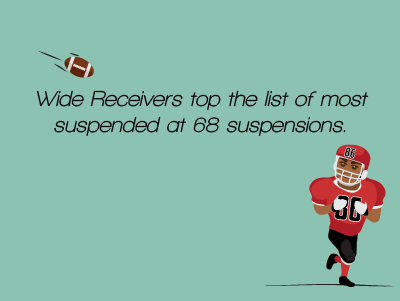
No player has been suspended more times for drug misuse across the entire National Football League than wide receivers. As the number of players being suspended for substance misuse continues to climb rapidly, the amount of time each player has been suspended has been in flux over the years.
Josh Gordon, the former Cleveland Browns wide receiver who recently opened up about his drug abuse history and insinuated that college-level coaches encouraged him by providing masking agents to help pass his drug tests. At the start of the 2017 season, the NFL rejected another request by Gordon to be reinstated in the league. In July 2017, Rams wide receiver Mike Thomas was suspended for four games for violating the league’s PED policy, and in 2016 Chicago Bear wide receiver Alshon Jeffery received the same suspension for similar prohibited substances.
Following wide receivers, linebackers accounted for 63 total suspensions since 1989 followed by defensive ends with 55 suspensions.
Changing The Narrative
The NFL may be the most lucrative sports league in the country, but they’re no stranger to controversy. In the same vein that experts have suggested the league may be sending mixed messages to both players and the public in the way that it addresses domestic violence, the NFL has yet to establish a consistent response to players caught misusing both recreational narcotics and performance-enhancing drugs. We believe wholeheartedly in the power of communication in substance abuse recovery, so if anyone you know needs assistance, consider a detox treatment center in Florida like FHE Health.
In reality, addiction is a serious disorder and without the right forms of treatment, it can be extremely difficult to manage the symptoms and take back your life. Above all else, addiction is a disease and often determination alone cannot cure it. At FHE Health, a premier mental health and addiction treatment facility, we know the path to recovery is different for everyone and people battling to overcome substance abuse deserve treatment plans tailored to their needs. If you or someone you love is suffering from addiction or if you need assistance with helping an addict, help is here for you. Visit us online at fherehab.com today to learn more.
Methodology
We collected every NFL suspension article since 1983. We then scraped every news article on the suspensions for any associated data. We then took the text and ran it through a textual analysis to pull out any drugs used.
Want to use our study?
Please feel free! All that we ask is that you include a link back to this page so readers can learn more about the study.
More of our Studies
Millennial Drinking Trends – A Look at Millennial Drinking Culture
Red, White, and Blue Pills – The Purity of Ecstasy State by State
Video Game Addiction Statistics – A look at America’s Gamers

Sources
- https://thinkprogress.org/the-nfls-hypocrisy-on-domestic-violence-exposed-in-a-devastating-3-minute-monologue-33e5cc3833ea/
- https://www.washingtonpost.com/news/early-lead/wp/2017/10/10/i-can-be-a-better-man-suspended-browns-wr-josh-gordon-comes-clean-about-his-drug-use/?utm_term=.172448080048
- https://www.marketwatch.com/story/the-nfl-made-13-billion-last-season-see-how-it-stacks-up-against-other-leagues-2016-07-01
- https://www.si.com/nfl/2016/11/14/bears-alshon-jeffery-suspension-performance-enhancing-drugs
- https://www.forbes.com/sites/mikeozanian/2019/09/04/the-nfls-most-valuable-teams-2019-cowboys-lead-league-at-55-billion/?sh=5ed372872f1b
- https://www.nfl.com/news/story/0ap1000000165680/article/anonymous-player-hgh-use-in-nfl-like-clockwork
- https://bleacherreport.com/articles/2602986-players-say-the-nfl-has-an-hgh-problem-even-if-peyton-manning-isnt-part-of-it
- https://www.mensfitness.com/sports/baseball/15-biggest-steroid-ped-and-doping-scandals-sports-history
- https://www.forbes.com/sites/darrenheitner/2017/09/25/why-nfls-first-positive-hgh-tests-deserve-more-attention/#4c037025663d
- https://theundefeated.com/features/a-life-too-short/
- https://www.cbssports.com/nfl/news/las-vegas-woman-says-ex-dolphins-coach-used-her-as-a-cocaine-platter/
- https://www.espn.com/espn/otl/news/story?id=3866837
- https://bleacherreport.com/articles/232404-the-steelers-steroids-and-profound-misconceptions
- https://www.drugabuse.gov/publications/research-reports/anabolic-steroid-abuse/what-are-health-consequences-steroid-abuse
- https://blogs.scientificamerican.com/news-blog/nfl-players-who-use-steroids-have-m-2009-02-20/
- https://deadspin.com/its-remarkably-easy-to-beat-nfl-drug-testing-1695935246
- https://www.espn.com/nfl/story/_/id/19836725/deangelo-williams-says-nfl-needs-do-more-help-suspended-players
- https://www.cbssports.com/nfl/news/the-cowboys-and-the-ravens-lead-the-nfl-in-drug-related-suspensions/
- https://bleacherreport.com/articles/2706576-randy-gregory-reportedly-fails-7th-drug-test-has-blown-off-nfl-officials
- https://www.espn.com/nfl/story/_/id/9707976/von-miller-denver-broncos-urine-collector-tried-cheat-test
- https://nflpa.com/active-players/drug-policies
- https://www.governing.com/gov-data/state-marijuana-laws-map-medical-recreational.html
- https://www.si.com/nfl/2017/08/17/roger-goodell-josh-gordon-reinstatement-cleveland-browns
